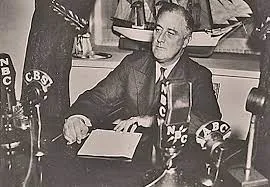“Arsenal of democracy” is a term that was first coined by President Franklin D. Roosevelt in a radio address to the nation on December 29, 1940.
The term refers to the role that the United States played in supplying military aid, including weapons, ammunition, and other equipment, to its allies during World War II.
The idea behind FDR’s arsenal of democracy speech was that the United States, with its vast industrial resources, could help to turn the tide of the war by providing military support to the countries fighting against the Axis powers.
The term is rooted in the belief that democracy, with its emphasis on freedom, liberty, and justice, was the ideal system of government, and that it was the responsibility of democracies to defend these values against tyranny and oppression.
The “arsenal of democracy” was thus seen as a symbol of the commitment of the United States to the defense of these values.

The United States did indeed play a crucial role in the outcome of World War II.
The U.S. was the largest industrial power in the world at the time, and its factories were capable of producing vast quantities of weapons, ammunition, and other military equipment.
This output was made possible by the unprecedented mobilization of the American economy and workforce, which saw millions of workers moving into defense-related industries and the government investing heavily in the production of military goods.
In addition to providing military aid to its allies, the “arsenal of democracy” also had a profound impact on the American economy.
The huge increase in military spending during World War II helped to stimulate the economy, leading to a period of rapid economic growth and full employment that would come to be known as the “economic miracle” of the 1940s.
The war also resulted in the development of new technologies and innovations, including radar, the atomic bomb, and new advances in aviation and electronics.
It has also had a lasting impact on American foreign policy.
The U.S. has continued to play a prominent role in world affairs, using its military and economic power to promote its values and defend its interests.
The “arsenal of democracy” has been invoked in a number of subsequent conflicts, including the Korean War, the Vietnam War, and the Gulf War, as a symbol of the U.S. commitment to the defense of freedom and democracy.
Despite its importance, the idea is not without its critics.
Some argue that the U.S. has used its military power in ways that have been harmful to the cause of freedom and democracy. For example, some argue that the U.S. intervention in Vietnam was not justified, and that it resulted in a prolonged and bloody conflict that did little to promote the cause of freedom.
Others argue that the U.S. has used its military power to advance its own interests, at the expense of the interests of other countries. This has led U.S. leaders to embrace soft power instead.
Use of “Arsenal of Democracy” in a sentence
- The “arsenal of democracy” symbolizes the transformation of the United States from a neutral nation to a major player in international politics, as well as its industrial might.
- The “arsenal of democracy” remains an important part of American history and is often cited as a symbol of American ingenuity, determination, and global leadership.
- The “arsenal of democracy” was a key factor in the ultimate defeat of the Axis powers and helped to establish the US as a dominant military and economic power in the post-war era.